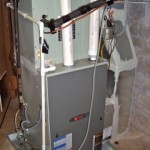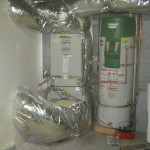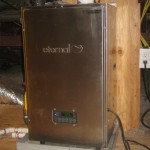Why is my energy bill so high?
Why is my furnace so loud?
Why does my furnace go off and on repeatedly?
Why is there stale, foul-smelling air coming from my vents?
Why are some rooms hot and some rooms cold with the furnace on?
First of all, if you hear a loud bang when the furnace turns on, but it’s mostly quiet after that, you may be experiencing delayed combustion. This potentially dangerous problem is caused by oil build-up in the ignition chamber, and should be fixed immediately.
If your furnace is just plain noisy, or smelly, or heating the house unevenly, you may want to consider upgrading. Some furnaces, even if they are still working ok, are simply too big for the building they are in (even new furnaces). Oversized equipment can heat up certain parts of the house too quickly, and then turn themselves off, cycling on and off and wasting energy.
If you use your furnace a lot, installing a correctly sized energy-efficient furnace can help with those high energy bills. In addition to being inefficient, some older combustion furnaces may not be ventilating air in an ideal way. Of course this also depends on the duct system and air leakage situation in your house.
There are some new home heating options that will not only be more efficient, but improve the overall comfort of your home, with better even heat distribution, and fresher air.
Sealed Combustion Condensing Furnaces
 How is this different than a normal furnace?
How is this different than a normal furnace?
A normal furnace (generally 75-80% efficient) pulls in air from the house, and heats it via a heat exchanger, or radiator, by burning natural gas. The oxygen used for combustion and the ensuing combustion byproducts never mix with the air in the house. This is necessary of course, however, a lot of heat is lost in the exhaust, which accounts for the major gap in efficiency.
A condensing furnace (89-98% efficient) utilizes this extra heat in a safe, eco-friendly, and much more energy efficient way. The “condensing” part refers to a process that transfers enough heat from the waste gases to allow for condensation. This has two benefits. First, all that latent heat produced when vapor converts to liquid can now be utilized. Second, the byproduct now becomes liquid waste, which is pumped out through an acid-resistant pvc flue. Furthermore, this type of furnace has an air intake and flue that lead directly the outside of the house, whereas most normal furnaces simply use the air around them for combustion. This closed loop prevents any possibility of backdraft into the house, which, in combination with the condensation method, vastly reduces the amount of CO gas (carbon monoxide, the gas we are concerned with for health and safety purposes) both inside and outside the house. This intake/exhaust system accounts for the “sealed combustion” part. Hence the name, sealed combustion condensing furnace.
Combined Hydronic Air Handlers
 Here is a completely different kind of heating system that utilizes your water heater to heat the air that is pushed through your ducts and into your home. Therefore the efficiency of these systems depend on the quality/efficiency of your water heater. These units can run off most domestic water heaters, but work best with the AO Smith Vertex tank water heater and the Eternal Hybrid (2 gallon) gas tankless as a second choice for homes with space constraints. (both of these are sealed combustion condensing water heaters and highly efficient).
Here is a completely different kind of heating system that utilizes your water heater to heat the air that is pushed through your ducts and into your home. Therefore the efficiency of these systems depend on the quality/efficiency of your water heater. These units can run off most domestic water heaters, but work best with the AO Smith Vertex tank water heater and the Eternal Hybrid (2 gallon) gas tankless as a second choice for homes with space constraints. (both of these are sealed combustion condensing water heaters and highly efficient).
How it works: Hot water from your water heater is run to the air handler. A fan blows air over the coils of hot water, heating the air and distributing it through your duct system.
Hydronic air handlers are not only efficient but also versatile and provide the highest levels of comfort. They can be adjusted to a wide range of heating loads, and supply air that isn’t overly hot, making for a more evenly heated, comfortable home. These units also support air conditioning, in combination with a cooling coil and an outside air conditioner.
[dropshadowbox align=”none” effect=”lifted-both” width=”640px” height=”” background_color=”#ffffff” border_width=”1″ border_color=”#dddddd” ]If you have questions about home heating systems or would like to find out which one is most feasible for your home, call (925) 363-4498 to speak with a home heating technician. By conducting an energy assessment on your home the most efficient and cost effective upgrades can be found.You can also e-mail: info@epbuilders.com[/dropshadowbox]


[…] and the effective R-values (thermal resistance) of your insulation, the size and efficiency of your furnace and/or air conditioner, and duct system. The test also examines your energy bill history, and […]